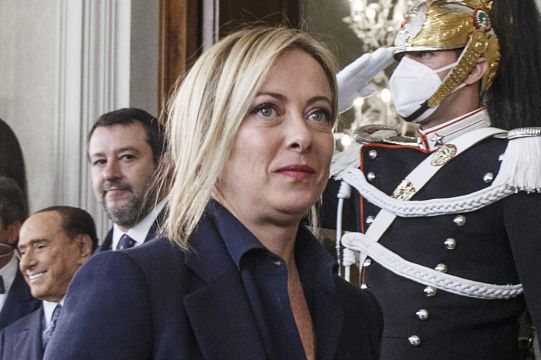Giorgia Meloni has formed Italy’s new ruling coalition, giving the country its first far right-led government since the end of the Second World War and becoming the first woman to serve as the country’s premier.
A presidential palace official announced that Ms Meloni and her Cabinet would be sworn in on Saturday.
Ms Meloni’s Brothers of Italy, a party with neo-fascist roots, secured the most votes in Italy’s national election last month.
A few hours before the new government’s formation was announced, Ms Meloni, 45, a career politician, told reporters that she and her allies had unanimously asked President Sergio Mattarella to give her the mandate to govern.

Obtaining the premiership capped a remarkably quick rise for the Brothers of Italy. Ms Meloni co-founded the party in December 2012, and it was considered a fringe movement on the right during its first years.
Ms Meloni made no public comments before leaving the Quirinal presidential palace. Earlier in the day, she met with Mr Mattarella along with her two main, sometimes troublesome, right-wing allies — Matteo Salvini and former premier Silvio Berlusconi.
Ms Meloni had cited urgent problems “at both national and international level,” apparent references to soaring energy prices afflicting households and businesses and the war in Ukraine, which has seen European Union members divided over strategy amid worries about gas supplies during the approaching winter.
Mr Berlusconi and Mr Salvini are long-time admirers of Russian leader Vladimir Putin; Ms Meloni staunchly backs Ukraine in its defence against the Russian invasion. Those differences could make coalition rule challenging.
Mr Berlusconi, a three-time premier, had chafed at the election victory of Ms Meloni’s party. The Brothers of Italy took 26%, while Mr Berlusconi’s Forza Italia and the anti-migrant League of Mr Salvini, snagged just over 8% apiece in an election on September 25 that saw record low turnout.
In 2018, in the previous election for Parliament, Ms Meloni’s party took just over 4%.
Still, while her forces are Parliament’s largest, Ms Meloni needs her two allies in order to command a solid majority in the legislature.
Mr Berlusconi, who fancies himself a rare leader on the world stage, recently derided her as “arrogant” in written comments, apparently after Ms Meloni refused to make a lawmaker who is one of the media mogul’s closest advisers a minister.
Earlier this week in a meeting with his lawmakers, he expressed sympathy for Mr Putin’s motivation for invading Ukraine.
In that conversation, which was recorded and leaked to Italian news agency LaPresse, he also bragged that Mr Putin had sent him bottles of vodka for his 86th birthday last month and he gave the Russian bottles of wine while the two exchanged sweetly worded notes.
In response to Mr Berlusconi’s comments that were also derogatory about Ukrainian President Volodymr Zelensky, Ms Meloni insisted that anyone joining her government must be solidly in sync with the West in opposing Mr Putin’s war.
If that meant her government could not be formed, Ms Meloni said, she would take that risk.
Mr Salvini has at times also questioned the wisdom of tough Western sanctions against Russia. A fellow lawmaker in Mr Salvini’s League party who was recently elected president of the lower Chamber of Deputies has publicly expressed doubts about continuing the measures.
Outgoing premier Mario Draghi’s national pandemic unity coalition collapsed in July, after Mr Salvini, Mr Berlusconi and populist 5-Star Movement leader Giuseppe Conte refused to back his government in a confidence vote.
That prompted Mr Mattarella to dissolve parliament and pave the way for elections some six months early.
While final efforts to form the new government were under way, Mr Draghi was in Brussels, attending the final day of a European Council summit, grappling with ways to deal with higher energy prices.
On Thursday, Mr Mattarella received opposition leaders, who raised concerns that Ms Meloni, who campaigned with a “God, homeland, family” agenda, would seek to erode abortion rights and roll back rights such as same-sex civil unions.







